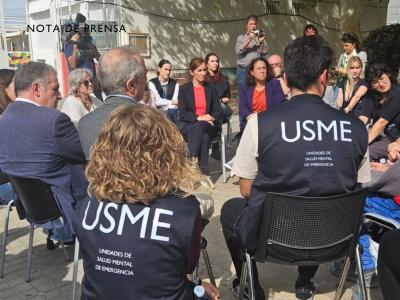Valencia, October 20, 2025. The Minister of Health, Mónica García, has travelled to Catarroja today to meet with the teams of the Multidisciplinary Emergency Support Unit (USME) and participate in community activities to support those affected by the DANA, alongside Victims' Associations.
Since its deployment more than two months ago in the affected areas, the teams have carried out more than 500 community interventions. This mobilization has benefited from the collaboration of more than 30 local entities, social, educational, and health organizations. Following an approach based on international evidence, the operation is designed to mitigate the emotional effects that intensify starting from the fourth month after a catastrophe.
Before the formation of the USMEs, two fundamental studies were carried out. Doctors of the World analyzed the emotional impact on communities, while APLICA carried out a detailed mapping of the resources available in the territory. These studies allowed prioritizing interventions and maximizing the impact of the USMEs on the local fabric.
The operation includes 13 teams, located mainly in Valencian municipalities and one in Letur, Albacete. One of these teams has a special focus on supporting victims' associations, given their level of emotional vulnerability.
The agreement between the Ministry of Health and the Valencian Government establishes that USME should focus on community interventions, such as strengthening social ties and collective emotional support. They have specialized professionals from various fields such as psychology, nursing, social work, and social education. The cases that require specialized care are referred to the autonomous health services.
The actions taken include psychological first aid workshops, emotional expression activities, and mutual aid groups. These interventions take place in various community settings, such as health centers and local associations.
In several municipalities, the USME units have been integrated into the Local Emergency and Reconstruction Committees, consolidating their role in post-disaster recovery plans. In addition, an intermunicipal working group has been created to incorporate the psychosocial approach into local emergency programs. Cooperation with organizations such as the Red Cross and Caritas has strengthened this support network.
Among the innovative initiatives, the highlights include the listening spaces for men in Algemesí, emotional venting groups for professionals in Sedaví, and intergenerational workshops in Aldaia and Utiel. In Catarroja, a dedicated accompaniment unit has been established for members of victims' associations, evidencing a solid and adaptive response to post-disaster needs.
Fuente: Ministerio de Sanidad



